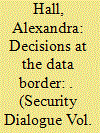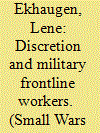| Srl | Item |
| 1 |
ID:
157100


|
|
|
|
|
| Summary/Abstract |
Discussions about the legitimacy of private security companies (PSCs) in multilateral military interventions abound. This article looks at how the United States has sought to legitimize the outsourcing of security services to PSCs through performance-based contracting and performance assessments. Both mechanisms aim to demonstrate the effective provision of publicly desirable outcomes. However, the immaterial and socially constructed nature of security presents major problems for performance assessments in terms of observable and measurable outcomes. Performance has therefore given way to performativity – that is, the repetitive enactment of particular forms of behaviour and capabilities that are simply equated with security as an outcome. The implications of this development for the ways in which security has been conceptualized, implemented and experienced within US interventions have been profound. Ironically, the concern with performance has not encouraged PSCs to pay increased attention to their impacts on security environments and civilian populations, but has fostered a preoccupation with activities and measurable capabilities that can be easily assessed by government auditors.
|
|
|
|
|
|
|
|
|
|
|
|
|
|
|
|
| 2 |
ID:
181960


|
|
|
|
|
| Summary/Abstract |
This article explores how military ‘frontline workers’ use their discretion to interpret and then comply, breach or bypass policies that reach into the tactical level, and why. Based on extensive primary sources including in-depth interviews, end-of-tour reports and data from records, the case study explores the implementation of policies on civil-military relations by military commanders in the Norwegian-led Provincial Reconstruction Team (PRT) in Afghanistan in 2005–2012. This article finds that the commanders used their considerable discretion to implement policies that parted from national directives. In doing so, the Norwegian military strove to align their approach with close allies and NATO and became actual policy-makers. This article contributes to the debate on how western militaries behave at the tactical level by employing the concept of ‘discretion’.
|
|
|
|
|
|
|
|
|
|
|
|
|
|
|
|
| 3 |
ID:
190066


|
|
|
|
|
| Summary/Abstract |
Informal groupings have proliferated in EU foreign policy over the past decade, despite the enhanced role of the High Representative tasked with ensuring the coherence of this policy domain under the Lisbon Treaty. This article analyzes how the decision of select EU member states to act on certain policy issues through informal groupings, bypassing the EU framework, affects the High Representative’s room for maneuver. Drawing on the principal-agent model, the emergence of informal groupings is conceptualized as a manifestation of pathological delegation, which undermines High Representative’s role. The findings reveal two factors that may nevertheless increase the agent’s discretion in cases of delegation anomalies: the low heterogeneity of member state preferences toward the informal grouping and the interaction between agents in the same domain, facilitating agent’s performance. By examining agent's discretion when delegation anomalies arise, the article may be useful for scholars investigating delegation and agency in international organizations.
|
|
|
|
|
|
|
|
|
|
|
|
|
|
|
|
| 4 |
ID:
140450


|
|
|
|
|
| Summary/Abstract |
The manner in which President Karimov's roles were recognized in the global arena affected how Uzbekistan's international relations developed – a perspective that highlights both the form and the content of bilateral relationships. While mutual interests are crucial to beginning a relationship, it is also important to understand how those relations were recognized in public and dealt with in private. If partners managed to recognize Karimov's agenda publicly, or at least act with discretion, this tended to create an atmosphere favouring cooperation. As such, recognition and discretion reveal much about Karimov's concerns with international equality and self-reliance, pointing to the reasons why Uzbekistan's relations fluctuated more with some actors than others. The United States and Germany are ideal examples of that ambivalent situation: Washington often cooperated with Uzbekistan on security matters, but then saw its military personnel excluded from Qarshi-Qanabad after the 2005 Andijan crisis; whereas Berlin witnessed little change in its relationship with Uzbekistan and continued to lease a base in Termez after 2005. This difference in outcomes can be explained in part by a dynamic of recognition and discretion.
|
|
|
|
|
|
|
|
|
|
|
|
|
|
|
|
| 5 |
ID:
113863


|
|
|
|
|
| Publication |
2012.
|
| Summary/Abstract |
American policy-makers are predisposed towards the idea of a necessary war of survival, fought with little room for choice. This reflects a dominant memory of World War II that teaches Americans that they live in a dangerously small world that imposes conflict. Critics argue that the 'choice versus necessity' schema is ahistorical and mischievous. This article offers supporting fire to those critiques. America's war against the Axis (1941-45) is a crucial case through which to test the 'small world' view. Arguments for war in 1941 pose overblown scenarios of the rise of a Eurasian super-threat. In 1941 conflict was discretionary and not strictly necessary in the interests of national security. The argument for intervention is a closer call that often assumed. This has implications for America's choices today.
|
|
|
|
|
|
|
|
|
|
|
|
|
|
|
|